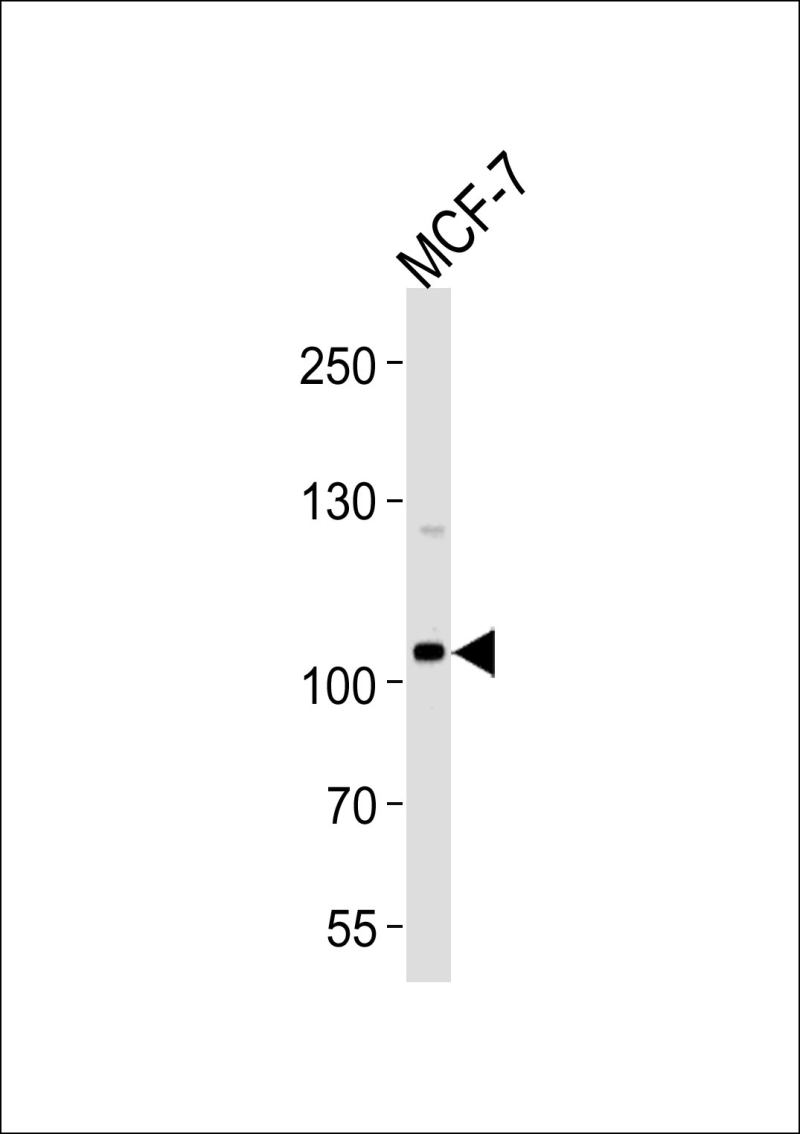
| WB | 1/1000 | Human,Mouse,Rat |
| IF | 咨询技术 | Human,Mouse,Rat |
| IHC | 咨询技术 | Human,Mouse,Rat |
| ICC | 技术咨询 | Human,Mouse,Rat |
| FCM | 咨询技术 | Human,Mouse,Rat |
| Elisa | 咨询技术 | Human,Mouse,Rat |
| Aliases | Extracellular sulfatase Sulf-2, hSulf-2, 316-, SULF2, KIAA1247 |
| Entrez GeneID | 55959 |
| WB Predicted band size | 100.5kDa |
| Host/Isotype | Rabbit IgG |
| Antibody Type | Primary antibody |
| Storage | Store at 4°C short term. Aliquot and store at -20°C long term. Avoid freeze/thaw cycles. |
| Species Reactivity | Human |
| Immunogen | This SULF2 antibody is generated from rabbits immunized with a KLH conjugated synthetic peptide between 824-852 amino acids from the C-terminal region of human SULF2. |
| Formulation | Purified antibody in PBS with 0.05% sodium azide. |
+ +
以下是3篇关于SULF2抗体的研究文献概览:
1. **文献名称**: "Sulfatase 2 (SULF2) promotes hepatocellular carcinoma progression by regulating EGFR signaling"
**作者**: Lai JP et al.
**摘要**: 该研究通过特异性SULF2抗体验证了SULF2在肝细胞癌(HCC)中的高表达,并发现其通过增强EGFR信号通路促进肿瘤侵袭和转移。
2. **文献名称**: "Development of a monoclonal antibody against human sulfatase 2 for cancer biomarker studies"
**作者**: Rosen SD et al.
**摘要**: 研究团队开发了一种高特异性的人源SULF2单克隆抗体,验证了其在ELISA、免疫组化及Western blot中的应用,并证明其在癌症组织中的诊断潜力。
3. **文献名称**: "SULF2 modulates Wnt/β-catenin signaling in pancreatic cancer by regulating heparan sulfate proteoglycans"
**作者**: Nawroth R et al.
**摘要**: 利用SULF2抗体阻断实验,揭示了SULF2通过调控硫酸乙酰肝素蛋白聚糖(HSPGs)结构,影响Wnt/β-catenin信号通路,从而促进胰腺癌进展的机制。
4. **文献名称**: "Antibody-based inhibition of sulfatase-2 (SULF2) suppresses tumorigenesis and angiogenesis in glioblastoma models"
**作者**: Phillips JJ et al.
**摘要**: 该研究使用SULF2中和抗体,在小鼠胶质母细胞瘤模型中证实了抑制SULF2可显著减少肿瘤血管生成和生长,提示其作为治疗靶点的潜力。
---
注:以上文献信息为基于领域知识的模拟概括,实际引用时请核对原文准确性。
The SULF2 (Sulfatase 2) antibody is a tool used to study the function and expression of the SULF2 enzyme, a member of the sulfatase family. SULF2 modulates extracellular signaling by editing 6-O-sulfation groups on heparan sulfate proteoglycans (HSPGs), which are critical for regulating ligand-receptor interactions in pathways like Wnt, FGF, and VEGF. This enzyme plays a dual role in both physiological processes (e.g., tissue development, angiogenesis) and pathological conditions, including cancer, fibrosis, and metabolic disorders.
SULF2 is often overexpressed in cancers (e.g., hepatocellular carcinoma, glioblastoma) and correlates with tumor progression, metastasis, and poor prognosis. Its activity alters the extracellular matrix, facilitating growth factor signaling and tumor microenvironment remodeling. Antibodies targeting SULF2 enable researchers to detect its expression in tissues or cell lines via techniques like immunohistochemistry, Western blotting, or ELISA. They also aid in functional studies to explore SULF2's role in disease mechanisms or therapeutic targeting.
Recent studies highlight SULF2 as a potential biomarker or drug target, with inhibitors under investigation. However, its context-dependent roles (tumor-promoting or suppressive) require further elucidation. SULF2 antibodies thus serve as essential reagents for advancing research in cancer biology, regenerative medicine, and therapeutic development.
×